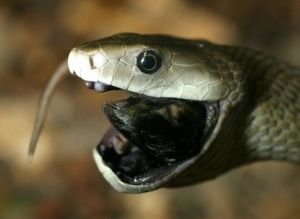News
Danish researchers upbeat on new antidote to black mamba venom
This article is more than 7 years old.
No horses or sheep are needed to produce this new antidote, as it is all done in the lab

Get bitten by one of these and you could be in real trouble – at least until the new antidote is ready (photo: Flickr/ Tad Arensmeier)
Denmark has only one native poisonous snake (the adder) and its bite is very rarely fatal, but worldwide the World Health Organization estimates that between 81,000 and 138,000 people die every year from snake bites.
In addition, many people who survive snake bites have to have limbs amputated, or suffer other long-term effects.
More effective and maybe cheaper
A Danish research team from the University of Copenhagen (KU) and the Technical University of Denmark (DTU), working together with Instituto Clodomiro Picado from Costa Rica and IONTAS from Cambridge, is now on the threshold of a breakthrough that could change all that.
“We’ve made the prototype of a completely new antidote that we expect will be more effective, more reliable and probably cheaper,” said Cecilie Knudsen, one of the KU researchers, told Videnskab.dk.
READ ALSO: Danish research could revolutionise snakebite treatment
The antidote has proved effective on mice injected with the venom from the black mamba, one of the world’s most poisonous snakes. One group of mice was injected with the venom alone and all died, the other group received a shot of venom and one of antidote. In the latter group, all the mice survived.
Going a new way
The new antidote is different inasmuch as it was synthesised in the laboratory based on antibodies produced by humans against the snake’s venom. Usually, antidotes are based on antibodies produced by horses or sheep, and this is not problem-free.
“It may be that the body thinks of the antibodies from animals as foreign and then starts to fight the antidote, and that can cause side-effects,” said Knudsen.
It has only recently been possible technology-wise to manufacture human antibodies in the laboratory without actually injecting humans with venom. The researchers created their antibodies in the laboratory with the help of white blood cells from donor blood.
READ ALSO: Danish researchers find the key to snake bite anti-venom
“The biotechnological method can be used to develop human antibodies where we simulate the human immune system in the laboratory and so avoid having to inject people with snake venom to obtain the antibodies needed to create a vaccine for immunisation,” associate professor Andreas Hougaard Laustsen from DTU, told Videnskab.dk.










































